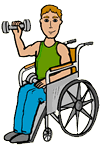Difference between revisions of "Wheelchair exercises"
(Created page with 'Management Tips right If you spend long hours in a wheelchair you know it can lead to uneasiness and be very uncomfortable, which is t…') |
|||
| (One intermediate revision by the same user not shown) | |||
| Line 1: | Line 1: | ||
[[Management Tips]] | [[Management Tips]] | ||
| + | [[व्हीलचेयर व्यायाम]] | ||
[[File:Wheelchair_exercises.gif|right]] | [[File:Wheelchair_exercises.gif|right]] | ||
Latest revision as of 21:55, 26 January 2012
If you spend long hours in a wheelchair you know it can lead to uneasiness and be very uncomfortable, which is true for anyone who is disabled. Keeping the body moving as much as possible in your wheelchair should be a regular part of your daily fitness program. This should be a priority no matter what your disability. Doing regular wheelchair exercise will help you increase your strength, flexibility, improve your mobility, strengthen your heart and lungs, and help you control your weight.
When starting or ending any workout or exercise session, it's important to take ten minutes to warm up.Start with simple exercises as outlined below and then move on to some of the more difficult exercises.
Your upper body workout should include exercises that include both arms, the torso, neck, and the shoulders. However, depending on the nature of the disability, everyone's situation is different so make sure to consult with your doctor.
Now for your fitness workout there are two types of wheelchair exercise that you'll want to use for your workout - and those are resistance training and strength training.
Resistance training: Resistance training uses large, stretchy rubber bands that are called resistance bands. Take the bands and wrap them securely around a stable object such as a door, or the arm of your wheelchair. Pull the bands towards you and then the other way away from you to give your muscles a good workout. Rubber bands can be used for pull-downs, shoulder rotations and arm and leg extensions.
Strength training: Strength training uses the lifting of 'free weights' or dumbbells. If you don't have 'free weights' or dumbbells try to find some cans of food that fit nicely in your hands. Or you might be able to find something better.You want to start with one or two pound weights and gradually work up. Do three sets of 12 repetitions for each exercise resting between each set.
You can use TV time to lift your weights if you aren't motivated to set up a daily routine. Combine exercise with some of your favorite television shows.
Some of the benefits you'll achieve through strength training include the ability to better perform daily activities such as pushing your wheelchair, holding or carrying items and transferring in and out of your wheelchair. Disabled people or wheelchair users often have what is called an inefficient 'push'. You can easily work these muscles.
If you have difficulty applying the above exercises resistance training or strength training due to your disability or for some other reason or for an added benefit get a DVD that will help you keep fit while you sit and offer exercises from a sitting position.
Always maintain a positive attitude about your workout and while you're working out. Try to get into a good regular wheelchair exercise and fitness program that you've designed for yourself regardless of your disability. If you can move something you can exercise.
Set realistic goals and reward yourself for working out. Don't do anything you know you shouldn't. Start slowly. Keep your eye on the end result. A simple but the best wheelchair exercise and fitness program can improve your overall health, boost your immune system, get blood flowing to the brain preventing brain diseases such as dementia and Alzheimer's and increase mobility for you. And encourage others who are disabled to exercise along with you whenever you get together for an added boost.

